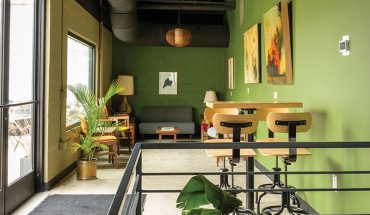A change in location delivers an updated perspective
by Jessie Ammons Rumbley | photography by Trey Thomas

“The life of a restaurant comes from the people in it and the experiences they create over the food,” says Amanda Haisley, executive chef of bu•ku restaurant. She’s walking through the cavernous space that was once An Cuisines, a popular upscale Asian restaurant in Cary. Without people, the place is spooky—barstools stacked on tabletops for more than a year, state-of-the-art kitchen equipment unplugged but at the ready. But soon, Haisley and her team will fire the equipment back up to open the new location of bu•ku here. “I think we just happen to be the right people at the right time,” says owner Sean Degnan, to revamp what he calls a “sacred” space. “We’re ready to do this the right way. And we weren’t even doing it the
wrong way.”
The restaurant closed its original doors in downtown Raleigh on New Year’s Eve, after almost 9 years in business. The new Cary location is a sort of bu•ku 2.0, offering the same small plates inspired by global street food, but refined in service and in its focus on community. The life of a restaurant, Degnan says, comes from the people inside it—and also the people behind it. “I really think you can taste the love put into food. When it comes from the right place, that translates.”

Measured approach
This is not Degnan’s first time opening a new restaurant. Along with co-owners Tony Hopkins and Todd Ohle, he opened so•ca, a Latin American street food restaurant, in Cameron Village in March 2017, and bu•ku Wake Forest in April 2018. (Meanwhile, Degnan also helped open the pay-what-you-can nonprofit restaurant A Place At The Table in downtown Raleigh.) But this endeavor is moving the flagship location, the one that started it all. The new doors are set to open in February or March, and the timing couldn’t be more perfect, Degnan says. “Our restaurant is going through a culture change right now,” he says. The hospitality industry is known for its demanding ethos of long hours and late nights, but Degnan and his leaders, including chef Haisley, are working to promote work-life balance and respectful, team-oriented attitudes. Moving physical locations has been an opportunity for the team to double-down on those efforts. The staff today is “the kids who turned into pros.”
The food, too, is “entirely new, while holding onto many of the themes of past menus,” says Haisley. When bu•ku first opened, “we were inspired by the food that the cooks were cooking for each other,” Degnan says. “That’s what ended up on the menu… the food they made for their friends.” Flavors lean Asian in influence, which will remain true in the new location. “There’s going to be a hotpot,” Haisley says, referring to the brothy, curry-infused dish that’s become one of bu•ku’s most popular. The rest will change regularly, inspired by staff’s friends and family as well as bu•ku’s loyal customer base.
Menu inspiration will also come from the Triangle’s diverse food scene. “We are well aware of the criticism that bu•ku can be considered a cultural appropriation restaurant,” Degnan says. They’re embracing the criticism as constructive. The new location is a little larger, providing room to host local guest chefs. There is a former sushi bar equipped with a mini kitchen, slightly apart from the main dining area, where folks behind popular food trucks and smaller local favorites can take over for a few weeks. bu•ku wine director Troy Revell and beverage director Tolson Kenney will then create paired drink lists to complement the food menu, Degnan says, and standout combinations are likely to end up on the main dining menu. These “test kitchen” collaborations, Degnan says, will “spotlight great local chefs,” while keeping the bu•ku menu constantly infused with energy and perspective. “The food on our menu will definitely still be our food, but going forward we want to create room for natural evolutions and additions.”
‘Fill the place with people’
Degnan refers to the new location as a “sacred” space because of its history. An Cuisines was a fine dining Asian restaurant associated with The Umstead Hotel and Spa, celebrated for the same high-end experience. “We fully expect people to visit bu•ku and compare it to An,” Degnan says. “You remember the most amazing Asian restaurant— that’s what we’re up against. We’re cognizant of that and we’re also doing what we’re good at: serving fun, small street food from around the world.”
Architect Courtney Evans of Raleigh’s Tactile Workshop reinterpreted the space to reflect the “fun fine dining” approach, Degnan says. What was once a grand main dining room will instead feel like an atrium, with ample light and plant life. And the two outdoor dining spaces, rarely used by An, will be activated and emphasized. Eating outside suits small plates, Degnan says. “If you’re having a $60 steak or piece of fish, you don’t usually eat outside. But if you’re trying octopus for the first time with your girlfriends, you might sit outside and have some drinks.”
The bright space reflects the fresh approach and the reinvigorated staff, who believe it will all add up to elevated and creative food. “A lot of the time, food is more inspired by how you feel and what you want to do for other people,” says executive sous chef Max Lai.
“We have the really fortunate opportunity to have every person who loved An come give us a chance, and every single person who loved bu•ku come give us a chance, too,” says Degnan. “All we have to do is be authentic and do what we do best… And fill the place with people. It’ll look really nice when it’s empty, but a whole lot better when it’s full.”



